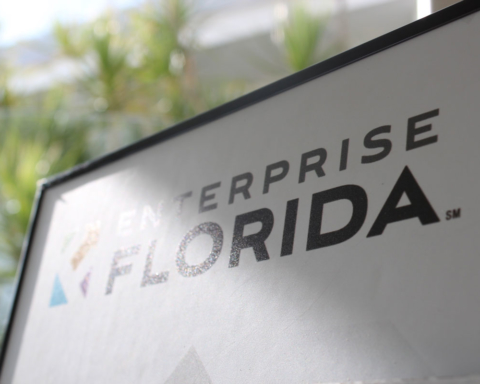With little pomp and no public availability, Gov. Charlie Crist signed the state’s $70 billion state budget Friday, vetoing $371 million in lawmaker spending priorities.
Crist’s list of line-item cuts include a $160 million sweep of dollars out of the transportation trust fund, a cut to the state’s Medicaid reimbursement rates for nursing homes, and a ban on using tax dollars flowing into the state to support human embryonic stem cell research.
Crist has stepped up his criticism of lawmakers’ budget handiwork in recent weeks, intimating he would slash much of the $300 million in college and university construction money legislators pumped into the spending plan late in the process. But the final tally falls short of his record, when the governor vetoed $459 million in pet projects from the budget in 2007.
Here’s the press release:
Governor Charlie Crist today signed the $70-billion 2010-11 budget, prioritizing Florida’s economy and job creation, keeping communities safe and educating the young people of the Sunshine State.
“With positive indicators beginning to appear, we must continue to keep our economy moving,” Governor Crist said. “The budget I signed today focuses our resources on helping families in need and giving Florida businesses incentives and opportunities to expand and create jobs.”
Governor Crist vetoed $371 million in projects that did not receive adequate open and transparent review and others that did not follow established processes or benefited only select groups. Among the vetoes is a $160-million sweep of the State Transportation Trust Fund in order to keep transportation projects funded that provide jobs for Floridians. In addition, he vetoed a reduction to the Medicaid reimbursement rates paid to nursing-home providers, a reduction to the rates that affect providers that serve Florida’s most vulnerable, and a prohibition against the use of any funds appropriated to the state to support human embryonic stem cell research.
“In reviewing every item in the budget, I have taken great care to fulfill my constitutional duty to ensure the appropriate use of the people’s money,” said Governor Crist. “Additionally, the people of Florida deserve an open and transparent government so they have every opportunity to shape the services and programs they support with their taxes.”
The legislature included a total of $260 million contingent upon passage of federal law to extend the enhanced Federal Medical Assistance Percentage (FMAP) through June 30, 2011. The enhanced FMAP rate will allow additional funding in the areas of transportation, economic development, health and human services, education and environment. Florida has already received over $3 billion from increased federal Medicaid funds under the American Recovery and Reinvestment Act of 2009.
Highlights of the state’s fiscal year 2010-11 budget include the following:
Governor Crist understands that government must wisely invest in attracting and growing businesses and industries in order to create high-wage, high-value jobs for Floridians.
In addition to signing the state budget, Governor Crist today also signed Senate Bill 1752, Florida’s Jobs Bill, providing strategic investments in a number of priority areas which will trigger job growth, business development and ensure long-term economic expansion for Floridians. The Jobs Bill includes funding for the State’s economic development incentive programs, assistance to small businesses, calculated support for Florida’s space business sector, critical relief for the unemployed and rural communities, and targeted assistance for Florida’s innovative film and entertainment industry. The Governor plans to hold a ceremonial bill signing for Florida’s Jobs Bill in the near future.
“The Florida Jobs Bill will improve the long-term quality of life for every Floridian by providing high-wage jobs and helping diversify our economy,” said Governor Crist. “Through a variety of economic development incentive tools, this legislation will help meet the needs of Florida’s businesses and help ensure a prosperous future for our state.”
Highlights of economic development initiatives included in the 2010-11 budget and substantive bills are:
• Back to School Sales Tax Holiday – Assists families in getting ready for the new school year, by exempting books, clothing and footwear that cost $50 or less, as well as school supplies that cost $10 or less, from sales tax for three days, starting August 13, 2010. The sales tax holiday is expected to save consumers an estimated $26 million.
• Innovation Incentive Fund – $75 million – allows Florida to compete effectively for high-value research and development projects, major innovation business projects and alternative energy projects, creating significant jobs and capital investment.
• Quick Action Closing Fund – $16 million – enables the state to respond quickly to extraordinary economic opportunities and compete effectively for projects that involve significant capital investment and the creation of high-wage jobs.
• Economic Development Tools – $16.5 million – funding supports the Qualified Target Industry Tax Refund (QTI) program to assist companies that create high-wage jobs and the Qualified Defense Contractors Tax Refund (QDC) program to preserve and grow Florida’s high technology employment base as defense contractors acquire new contracts.
• Space Initiatives – provides $3.9 million for Space Florida operations; $11.1 million for launch complexes and space transportation facilities; $10 million for financing, business development and infrastructure needs; $3.2 million for retraining workers; $3 million for targeted business development support services and business recruitment.
• Film and Entertainment Incentives – the appropriation provided in past years has been replaced by a new entertainment industry tax incentive program totaling $242 million over five years.
• Institute for Commercialization of Public Research – $3 million – provides funding to assist in the commercialization of products developed by the research and development activities of small Florida businesses.
• Economic Gardening Technical Assistance Pilot Program – $2 million – provides funds to be administered by the Economic Gardening Institute to provide grants to local and/or regional organizations and governments seeking to implement or expand local economic gardening programs.
• Florida Small Business Development Center Network – $500,000 – provides funding to invest in existing small business assistance groups that help entrepreneurs and small businesses.
• Enterprise Florida – $11.1 million – supports the continued operations of Enterprise Florida Inc., which helps Florida businesses expand their international footprint through trade counseling, markets Florida as a business destination of choice, and coordinates the use of economic development incentives.
• Florida Commission on Tourism (VISIT Florida) – $26.6 million – supports the state’s official tourism organization to promote and generate travel to and within the Sunshine State.
• Black Business Investment Board – $2.75 million – continues support of the Black Business Loan Program which provides loans for black business enterprises that cannot otherwise obtain capital.
• Florida Sports Foundation – $2.5 million – promotes the state’s sports industry and supports the Sunshine State Games.
• Defense Infrastructure – $5 million – to address the infrastructure needs of communities surrounding Florida’s military installations.
• Military Base Protection – $1 million – supports the retention of military installations potentially affected by federal base closure or realignment. Also supports a number of reinvestment grant programs that assist defense-dependent local communities in the diversification of their economies.
• Rural Infrastructure – $1.1 million – to assist rural communities in funding capital investments and diversify their economies.
• Job Creation Assistance – provides $10 million in corporate income tax credits over two years to qualified businesses hiring previously unemployed Floridians.
• Employment and Career Education Services – maintains funding to improve access to job training, skills development and employment services.
• Assistance to Unemployed Floridians – provides additional staffing for efficient Unemployment Compensation benefits claims processing.
• Libraries – provides $22.5 million for aid to libraries to match $8.9 million in federal funds.
• Affordable Housing – provides $37.5 million for affordable housing homebuyer down payment and closing cost assistance.
TRANSPORTATION
After Governor Crist’s veto of a $160-million sweep of the State Transportation Trust Fund, the 2010-11 budget includes $5.8 billion for the Florida Department of Transportation’s work program. For every billion dollars invested in transportation infrastructure, 28,000 jobs are retained or created; therefore, the work program supports the creation and retention of 162,000 jobs. Governor Crist has made reducing congestion on Florida’s roadways and ensuring the safe and efficient movement of goods and services a top priority. Sound transportation infrastructure benefits families getting to work and school and every business owner moving goods or providing services – as well as every tourist visiting the Sunshine State.
EDUCATION
The 2010-11 budget will provide appropriated funds of $22.3 billion to help create world-class schools in Florida so that graduates are qualified to serve in the high-tech, high-wage jobs of the future.
Voluntary Pre-Kindergarten (VPK) – The budget includes $404.4 million – an increase of $37.6 million, or 10.2 percent – for Florida’s VPK Program to ensure that early childhood education is available for all four year olds. Funds will cover an additional 8,895 children expected to enroll in the program. The base student allocation has been reduced by 0.5 percent, and administrative fees have been capped at 4.5 percent. An additional $25 million was also provided to address enrollment growth in the current year.
Public Schools – The budget provides $18.1 billion – an increase of $111.3 million, or 0.62 percent – for the Florida Education Finance Program (FEFP), which funds public schools. This allocation increases per-student funding from $6,842.29 to $6,843.51, or $1.22 per student. Compared to current-year funding, state funds increased by $848.9 million, or 10.5 percent.
In addition, $21.2 million for the Excellent Teaching Program will provide an approximate four-percent, or $1,900, bonus for teachers who have earned certification from the National Board for Professional Teaching Standards.
Community Colleges – The Florida College System will receive a total of $1.12 billion, an increase of $68.4 million, or 6.5 percent. With tuition, the increase is $126.5 million, or 7.1 percent. Funds will provide associate degrees, as well as increase the number of partnerships with four-year institutions and baccalaureate programs in critical job areas.
Universities – The State University System (SUS) is provided a total of $2.3 billion, an increase of $74.4 million, or 3.3 percent. With tuition, the increase is $198.1 million, or 5.8 percent. Funding includes $10 million for the SUS New Florida Initiative to enhance university-based research, increase degree production, and expand programs in the fields of science, technology, engineering, math, and medicine (STEMM).
ENVIRONMENT
Florida’s economy is closely linked with our beautiful natural resources, and Governor Crist is committed to preserving and maintaining Florida’s environment in order to increase the overall quality of life for present and future generations of Floridians and visitors. Highlights of the 2010-11 budget include the following:
• $15 million for Florida Forever land acquisition program.
• $50 million for Everglades restoration. To date, Florida has invested more than $2.4 billion in the 30-year, $10.9 billion Comprehensive Everglades Restoration Plan, the 50/50 state and federal partnership to restore and protect the Everglades.
• $15.5 million for Beach Restoration Projects. An additional $1 million is contained within Senate Bill 1752.
• $120 million for Petroleum Tank Cleanup Program.
• $11.2 million for State Parks Repairs and Enhancements.
• Sustainable Water Resources
$6.3 million for water quality programs vital to the preservation of Florida’s springs, rivers, lakes and wetlands.
$13.6 million for Small Disadvantaged Wastewater Treatment Facilities Grant Program.
$99.7 million for Drinking Water Facility Construction Revolving Loan Program.
$171.6 million for Wastewater/Stormwater Treatment Facility Construction Revolving Loan Program.
• Energy – To encourage economic investment in Florida, as well as promote and enhance the use of alternative and renewable energy technologies, the 2010-11 budget includes $2 million for a grant project to support the development of high-mileage, ultra-efficient cars designed and built in Florida.
HEALTH AND HUMAN SERVICES
The 2010-11 budget provides an opportunity for hospitals, nursing homes and county health departments to “buy back” reimbursement rate reductions through contributions from county or other governmental funds. In addition, the budget includes the following:
• $817 million, to fund the Medically Needy program through June 30, 2011.
• $626 million, to fund the Medicaid Aged and Disabled (MEDS AD) program through June 30, 2011.
• $50 million, to fund biomedical and cancer research, including $10 million for the H. Lee Moffitt Cancer and Research Center.
New Adoption Subsidies – $130.6 million, for subsidy payments provided to 31,526 families, including 3,045 new adoptive families. Since launching the Governor’s Explore Adoption initiative in 2008, Florida has set state records for the number of adoptions of children from foster care, with 3,777 children adopted in Fiscal Year 2008-09 and 3,674 children adopted in Fiscal Year 2007-08. Last year, Florida received a nearly $10 million federal bonus for leading all states in increasing the number of children adopted from foster care.
PUBLIC SAFETY
Last month, Governor Crist announced Florida’s 2009 Annual Uniform Crime Report, which shows the state’s overall index crime rate has reached a 39-year low, declining by 6.4 percent compared to 2008. Highlights of the 2010-11 public safety budget include the following:
Prison Beds – With slower growth in the prison population than originally projected for Fiscal Year 2009-10, the Florida Department of Corrections (DOC) realized a savings of $23.6 million. Together with these savings, the 2010-11 budget includes $22.6 million to open the Blackwater River Correctional Facility in Santa Rosa County as a privately operated prison with 2,224 beds, achieving a savings of $1.6 million. DOC is identifying dorms across the state that can be closed in order to transfer inmates to Blackwater.
Savings – The following additional public-safety savings will be achieved:
• $1.4-million savings associated with 1,350-bed adult male custody beds by reducing operational costs or subcontracting operations.
• $2.3-million savings by reducing operational costs of 863 DOC-operated work release-center beds and an additional 600 beds scheduled to become available during Fiscal Year 2010-11. DOC is required to operate these beds for no more than $22 per day, or to subcontract for the operation of the1,463 beds.
• $7-million savings by reducing 175 of the current 4,299 juvenile offender residential beds, an overall 4 percent reduction.







